Over the past 12 months, I’ve doubled down on finding the best ways to attract traffic to legal websites.
Why should you care?
Because I’ve literally looked at hundreds, perhaps even thousands, of legal websites constantly auditing them for their best (and often their worst) characteristics.
I’m going to call a spade a spade in this article.
But it will lead to better outcomes for your law firm.
Let’s get started.
Why Google is King for Law Firms
Undoubtedly, Google loves legal sites. This is a great example of that…

Huge traffic growth over a 12-month period.
But Google only loves it if your site doesn’t suck. (I can just hear the wind leaving your sails).

If fact, if you compare law firm sites to something like an eCommerce site you’ll see that in most cases organic traffic makes up 50%-80% or more of a law firm’s traffic profile.
While Google isn’t the only channel I’ll recommend, as you’ll see below, it’s simply too good to ignore.
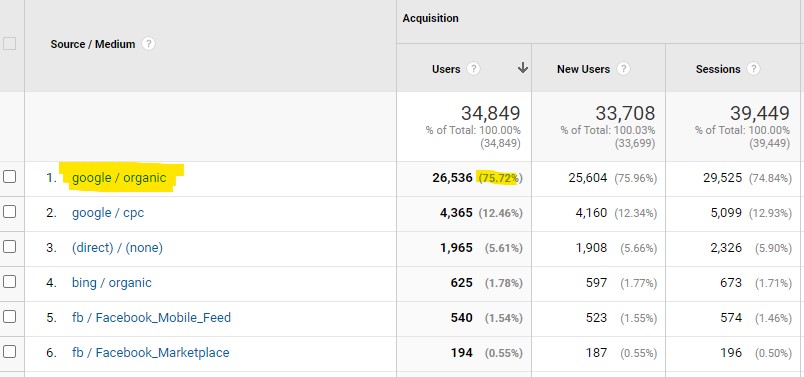
The above example is a law firm that’s also spending $35,000 per month on Google Ads and yet their organic traffic is still 75% of the total traffic.
Google Ads and Organic make up about 88% of the total traffic.
That’s huge.
Compare that to an eCommerce site and you’ll find their organic only makes up 10-15% of their traffic profile. People find lawyers with Google, people find eCommerce products in many different ways.
This shows that it is still a golden era for law firms with Google.
So if you’re a partner, director or even a marketing manager at a legal firm, this guide will be a massive help for you in 2023.
11 reasons why your legal site doesn’t receive any traffic
I see lawyers consistently making the same mistakes with their sites.
Some of these are so simple to improve you’ll be reeling at the fact that you didn’t do it sooner.
In a large portion of these, you can actually control yourself without any need for outside help.
If you have time that is and want to learn it.
Here are common mistakes:
- You’re optimising your home page for everything.
- You only list 400 words on a page and haven’t optimised it well for any search terms.
- You don’t add images or indexes to your blog content to make it easier to digest and navigate.
- You add news and content that nobody is searching for.
- You use an obscure content management system that has poor search optimisation features.
- You use an obscure content management system that doesn’t let you add content effectively.
- You continue to say the exact same thing that every other legal firm says (even when you say you’re unique).
- Your web developer didn’t care for lead generation or conversion optimisation which leads you to turn off your paid traffic campaigns because the performance is so bad.
- You work with an agency using the classic “set and forget” strategy giving you no attention.
- You are a marketing manager trying to do everything but you can’t possibly be an expert at everything or do everything that’s required to build a high-traffic site.
- You simply don’t market your firm and rely purely on word of mouth and referrals.
I could go on but I think you got the point.

Optimising your site effectively for SEO
Now teaching you how to do SEO (Search Engine Optimisation) for your legal website in this article will be incredibly challenging.
Quite simply, it’s not going to happen.
Sorry to break it to you.
So what I’d rather do is inform you of a few things you definitely shouldn’t do.
Don’t optimise the home page for everything
Below is a great example of copy trying to over-optimise the home page for everything.
Mentioning all of your services plus multiple locations all from the same page is a big no-no.
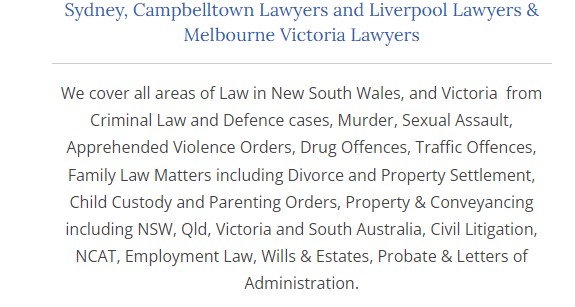
Google gets confused because you have lots of pages that are somewhat relevant but nothing that’s super relevant.
How should you optimise it?
Your home page should primarily be optimised for your brand name and maybe an encapsulating term such as “Lawyers <+Capital City>”.
Don’t over-optimise the page title and description either.
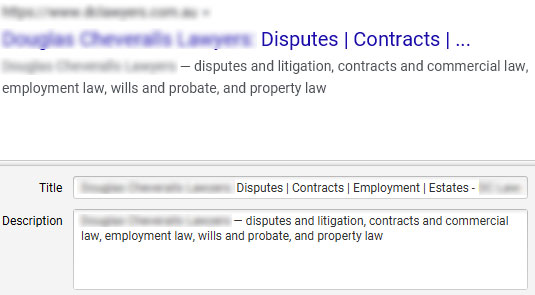
Poorly optimised title and description
For example, if you’re a family lawyer in Melbourne and you don’t plan on practising in other states then having the home page optimised for “Family Lawyer Melbourne” would be fine.
If you plan on a multi-state strategy then perhaps optimise the home page for “Family Lawyers Australia” and then have internal pages for each city or location you wish to target.
In my opinion, I would recommend you only optimise your home page for your brand and leave your internal pages to do the hard lifting.
If all of this is complete gibberish then hire an agency to help you.

Don’t just add 400 words of content
I wrote a comprehensive guide on blogging for businesses but most of the tips will apply to any form of content on your legal site.
Below is a great example where a law firm has the right idea but the execution is bad.
They’re creating pages for the areas they practice in (✔️) but then they’ve made the crucial mistake of not adding enough content (❌) to them for Google to take any interest.
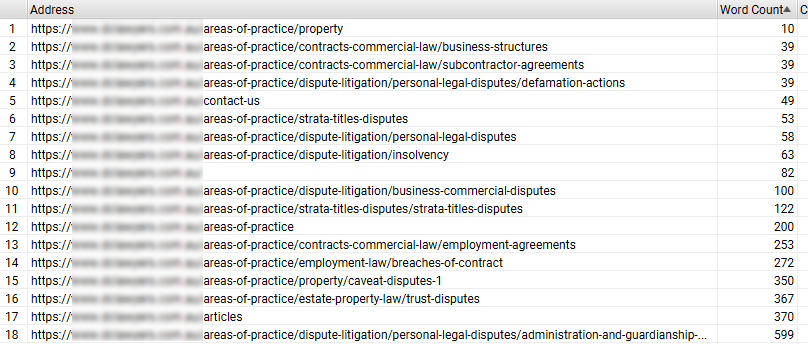
In my guide, I talk about using software like Surfer SEO.
Using Surfer SEO, you can align your content with high-ranking content pieces and therefore you’re not just creating content blindly but you’re using data to guide you towards developing content that will be highly effective for your business.
What Surfer SEO will do is compare your site versus other high-ranking sites on specific search terms and provide you with a list of recommendations to improve your content.
In the below example, there are 33 points of improvement that can be made.
This is something that you can fully control and it’s relatively easy to do other than the time it takes you to write it.
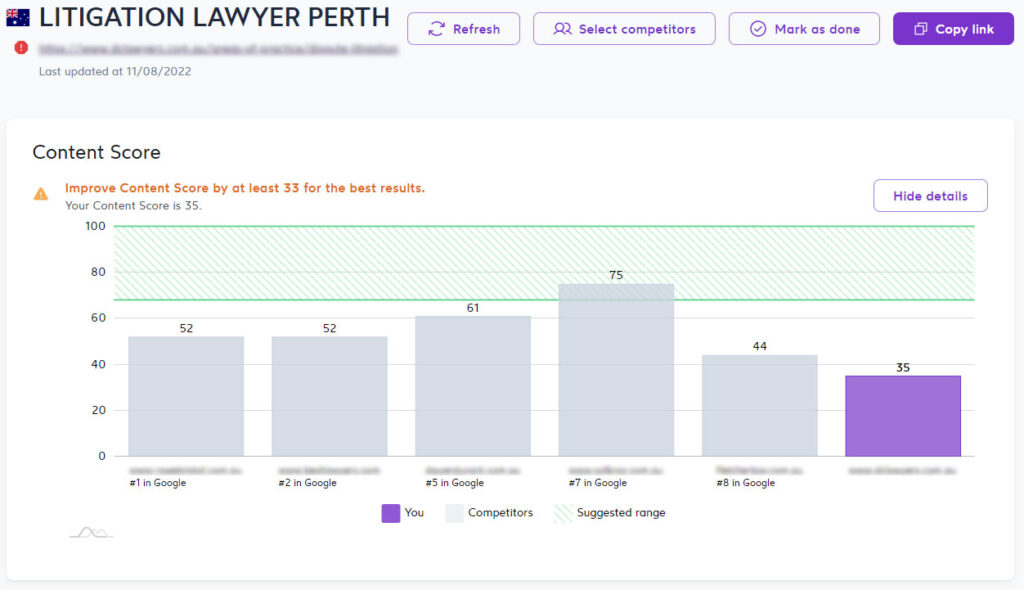
Don’t keyword spam
You would think in 2023 keyword spamming would no longer be a thing.
It still is 🙄.
Below is a great example of keyword spamming where you constantly repeat the same thing in hope of achieving better rankings.

A simple rule of thumb is that if you wouldn’t speak to your clients in this way then why speak like this on your website?

Imagine having your first call with a potential client…
“Hi Sarah, welcome to best Sydney criminal lawyers today. How may I help you today by providing our best Sydney criminal lawyer services to help you resolve your best Sydney criminal lawyers case“.
It’s completely ridiculous, we need to stop doing this.

Have a unique page for every practice area you target
Without getting too technical just know that Google loves relevance.
Creating hyper-relevant content is the key to building a successful organic strategy.
So how do you do that?
The first step is to build out pages for each of your practice areas and any sub-areas.
For example, if you’re a family lawyer then you probably want a page for each of the following:
- Family & Divorce law
- Child Custody
- Property Settlements
- Domestic Violence
- Financial Agreements
- Prenuptial Agreements
- etc.
Create a page for each of these on your site and optimise it with the right content (using Surfer SEO again) and you’ll already be a step ahead of many.
A great example of that is this site here where you can see this law firm ranks for a multitude of different service-related search terms simply because they’ve created a page for each and added an optimised amount of copy to each page.
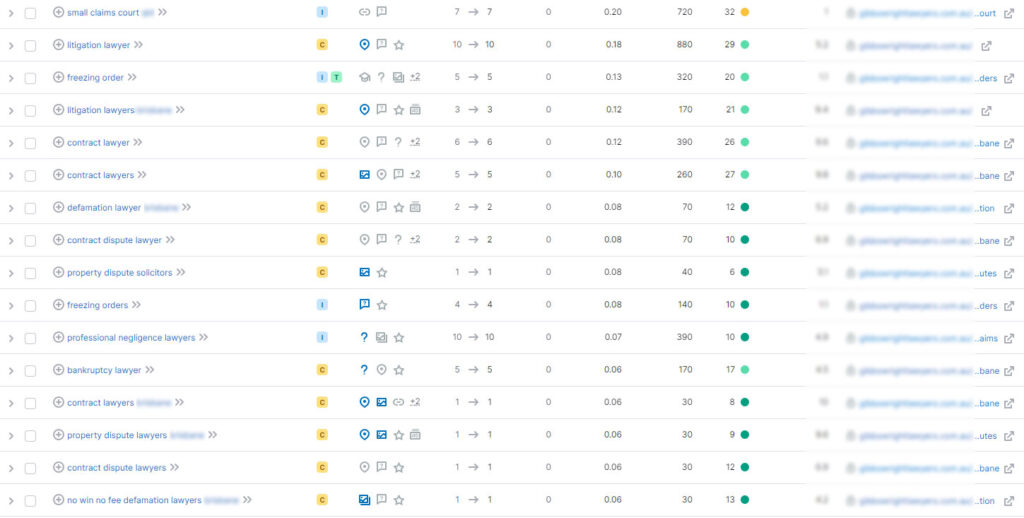
Creating location pages
If you’re practising in multiple states then the chances are high that you want to create content per location.
Remember when I said don’t optimise your home page for everything?
Well, this is why!
It’s very difficult for one page to be relevant for three different locations.
I’ll say it again, Google loves relevance.

Let’s say you’re practising family law in three different states.
Then you’d have a site structure something like this:
- /melbourne/ <- (ranks for family law Melbourne)
- /sydney/ <- (ranks for family law Sydney)
- /brisbane/ <- (ranks for family law Brisbane)
Where you have a page on your site for each location you service.
However, let’s say you want to optimise multiple services for each location, then you might have a URL and page structure like this:
- /melbourne/ <- (parent page)
- /family-law/ <-(child page) (ranks for family law Melbourne)
- /child-custody/
- /sydney/
- /family-law/ (ranks for family law Sydney)
- /child-custody/
- /brisbane/
- /family-law/ (ranks for family law Brisbane)
- /child-custody/
You can obviously see that if you want to be found in a lot of locations and you have a lot of services then it’s a huge amount of content and can start to get quite complicated.
This strategy can suck in traffic on overdrive.
Help reporters with Haro & SourceBottle
HARO (Help a Report Out) and SourceBottle are two websites where media outlets and journalists are looking for comments, interviews and more for their content.
When you sign up you’ll receive notifications every day with different outlets requesting input from individuals or companies for their media.
For example, in the image below I highlight how a national news outlet is looking for a property lawyer to provide some “legal wisdom on material fact when buying a property”.

I’ll repeat that again…. a national news outlet wants your law firm’s input.

Using SourceBottle I’ve managed to get mentioned in The Sydney Morning Herald and The Age and the impact on traffic to your site can be significant (even when they don’t link to you).
Not every opportunity is a diamond but if you keep digging you’ll certainly find some gold along the way.
Blogging (But Doing It The Right Way)
Again, I wrote about this recently and I’m going to summarise the tips here rather than write them all again.
For lawyers, publications and blog content is one of the single best ways you can get a lot of traffic to your website.
Here’s an example of when you get blogging right for your law firm and it delivers over 30,000 visitors to your site every single month.

If you’ve only added one blog to your site since it was built 2 years ago then you’re missing out.

Those are rookie numbers, you’ve got to pump those numbers up
In short, here are my tips to create better content:
- Be involved – the value comes from the individual who has the experience.
- Stand for something – don’t just repeat the same things everyone is saying – make bolder points.
- Optimise it – use Surfer SEO or an agency to help you optimise the content effectively.
- Speak to the right audience in the right language – speak to your ideal customer and their pains.
- Make content digestible – use short sentences, use headings, use images, use an index, stop using as much legal jargon and make it fun.
For the comprehensive version of the above and much much more, I encourage you to read my article Blogging For Business: How To Attract Prospects & Generate Revenue for Australian Businesses.
Paid Advertising
Traffic isn’t always free.
Despite it being a golden era for law firms with organic traffic, that doesn’t mean you should ignore paid.
There are countless ways to get paid traffic these days with Google, Facebook, TikTok, YouTube and many more competing for your dollars.
The main thing is that you attract it profitably otherwise it can quickly cost a lot of money.

Some of the main things I see happening with lawyers’ Google Ads accounts are:
- Wasting money on other law firms’ brand terms
- Wasting money on names of lawyers that don’t work for them
- Wasting money on irrelevant traffic like display ads or youtube.
- Not tracking your spending correctly
- Paying for “free lawyer” terms
- Overpaying by using automated bidding strategies before you’re ready for it.
- Using performance max or other campaigns that don’t provide you with any visibility
- Using an agency that doesn’t care.
- Using an offshore team that doesn’t have a solid process.
- And many more.
There are countless ways to lose your money on Google.
Promoting your blog content with paid Google traffic.
One of the techniques I love is combining paid with your blog posts.
Rather than targeting the high competition terms that will cost you $10-$30 dollars per click you can create something called a dynamic search ads campaign (DSA) using Google Ads.
In simple, what you can do is tell Google to use your blog content, by feeding it a rule, and Google will then determine which search terms are relevant to target with ads.
So rather than targeting “Family Lawyer Melbourne” you could target “how much does a family lawyer cost” and send it to your blog post. It can still convert really well.
Google will try to align relevant search terms and send them to the most relevant article on your site.
It’s a great way to attract new clients at different stages of the buying lifecycle rather than just targeting the expensive red hot bottom-of-the-funnel traffic.
Legal Specific Directory Sites
Niche-specific legal directories can be great links to have. Not only can they have an impact on your rankings, but they can also drive traffic and leads.
They do typically come at a cost and they can be quite pricey but the reality is that it doesn’t take much in the legal space to quickly get a return on investment.
Some of the sites you can consider are:
- Lawyers.com.au
- threebestrated.com.au
- top10lawyers.com.au
- justmelbourne.com.au
- sydneyreview.com.au
- bestlawyers.com
- australianlawyersdirectory.com.au
Using Lawyer Bio Pages
My final tip is to create lawyer bio pages.
The names of the lawyers in your firm often can generate a significant amount of organic traffic.

Your team is kind of a big deal right now.
Rather than listing them all on one page, you want to list them on a team page and create an individual page for each of them.
It’s going to help them perform much better.
Here’s an example of a law firm using this effectively.
Some lawyers have over 1300 searches per month.
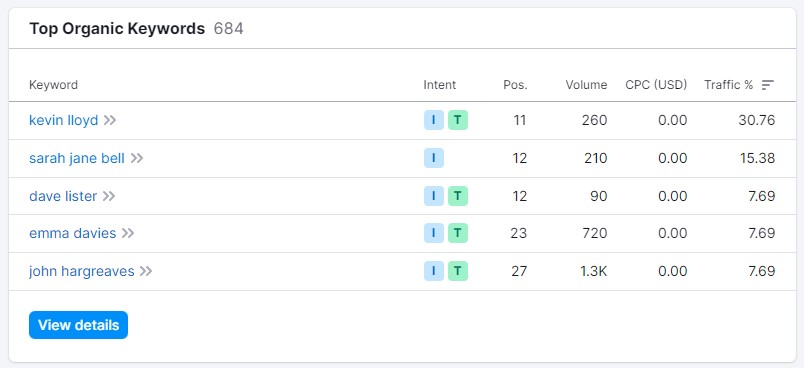
Time To Sit Back And Watch The Traffic Flow
So there you have it, how many of these are your law firm ticking off on?
Chances are you’re missing quite a few and if that’s the case it means you’ve got a tonne of opportunity.
I’ve tried to keep this article as simple as I can but the reality is that implementing these can be quite tricky.
I can teach you how I speak fluent Japanese but when your turn comes to speak it back, it obviously won’t happen straight away.
So if you’re looking for more traffic in 2023 for a law firm or you think more traffic = more leads then you need an agency that can help.
Aka, PixelRush!
I’d love to have a chat with you to see how we can help align your digital marketing with your business strategy and goals this year.
Cheers for the article mate. Nearly finished my comic site so having the google speed link will come in handy. Cheers 🙂
Awesome man. Glad you got some value, take a look at w3 total cache too if you want to get a good score.